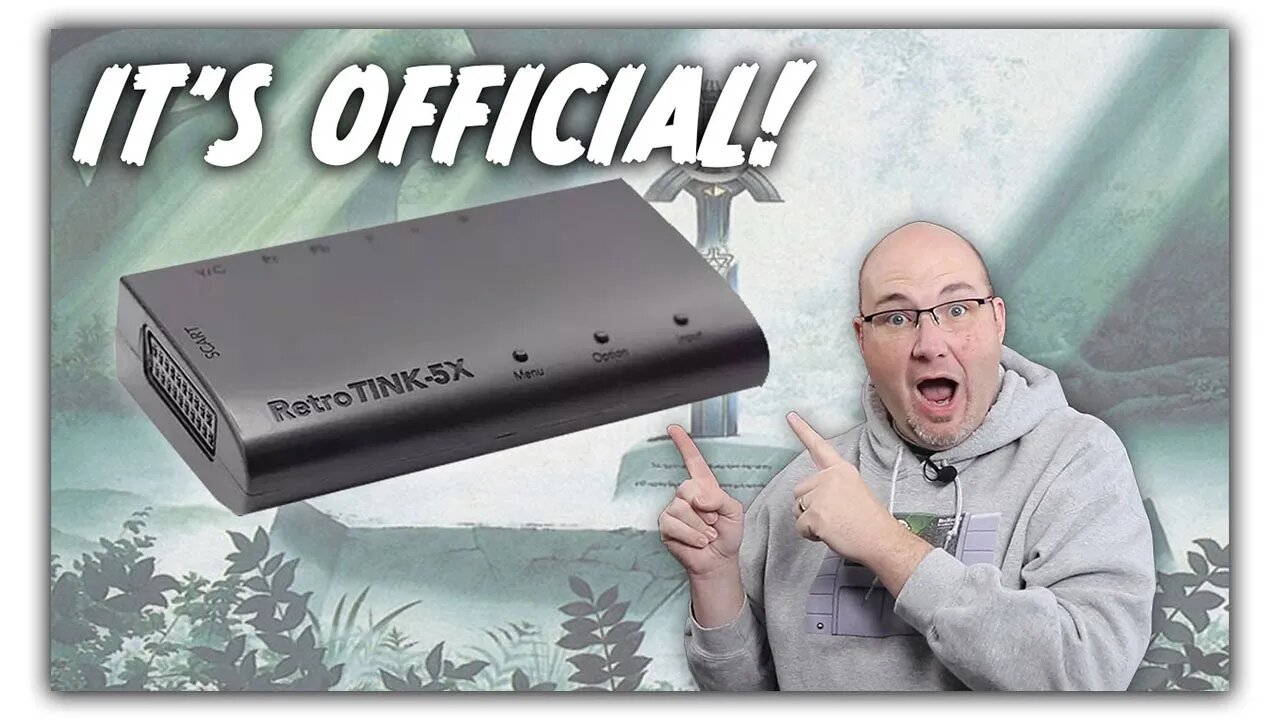Premium Only Content

All-New RetroTink-5x Line Multiplier Officially Coming May 1, 2021
In this episode, we share the news from Mike Chi from RetroTink on his new upcoming RetroTink 5x Pro line multiplier and upscaler.
When it comes to connecting old video game systems to modern televisions, you can sometimes run into challenges. Some TVs no longer have component or composite video inputs on it. Some cannot correctly display 240p signals. Some simply don't look good when blown up to large modern televisions. That is where Mike Chi from RetroTink comes in, as he has been working to provide budget friendly quality upscalers for the last few years. To date, his upscalers have maxed out at two times line multiplying, which essentially means a 240p signal like from the NES or the Super Nintendo would go from 240p to 480p. He is now raising the bar with his latest product, the RetroTink 5X.
While not available at the time of this filming, pre-orders will be open on May 1st, 2021 at 9:00 a.m. Pacific. Customers will be limited to one per order, so hopefully we don't run into issues with people hoarding these things. At $275 each, it's not going to be a cheap investment, but good is seldom cheap and cheap is seldom good. For customers in the UK, Mike will be able to ship to you via DHL using a different link to purchase.
From the box, the RetroTink 5X has inputs for component video, composite video, s-video, and RGB SCART. Designed to be the first automatic optical phase algorithm to boost the sharp edge image with zero adjustments needed, the RetroTink 5x is powered by a custom developed FPGA motion adaptive deinteracing algorithm specifically for games. The goal is to make 480i titles look terrific without adding additional lag or flicker. Input sources can be either 240p, 480i, 288p, 576i, 480p, 720p, or 1080i. You can then output in 480p, 720p, 768p, 1080p, 1200p, and 1440p.
One of the main things that people are always concerned about with is adding lag, latency, or delay when using devices such as this. That's been one of the strengths of the previous RetroTink 2x models has been the nearly lag free performance. The latency of the RetroTink 5x is measured to be at less than one quarter of one frame in frame lock, and 1/4 to 1 and 1/4 frames in triple buffering. That should translate to a pretty responsive experience.
Unlike the OSSC, the RetroTink 5x will be a more complete unit right from the box. Inside the Box you will get the RetroTink 5x itself, and infrared remote control, micro USB cord, quick start card, and a RetroTink sticker. For an additional $5, you can add a SCART to composite adapter which will allow you to convert the SCART port into a secondary composite input. This ain't even more value for those who will never use SCART. You'll simply need to provide your own USB Power Supply, something most of us should have lying around.
I am extremely excited to get my hands on a RetroTink 5X and finally retire my OSSC. It has never worked quite right with my Nintendo consoles, however it has done a decent job with my Sega systems. Come the morning of May 1st, I will be on the RetroTink website, PayPal ready, for my pre-order. Congratulations to Mike on bringing an amazing product to market, and kudos also to Voultar for all of his hard work on this project as well.
#RetroTink5X #MikeChi #RetroGames #UpScaler #OSSC #Framemeister
The footage used in this review are used under the Fair Use laws, referenced below:
https://www.law.cornell.edu/uscode/text/17/107
Notwithstanding the provisions of sections 106 and 106A, the fair use of a copyrighted work, including such use by reproduction in copies or phonorecords or by any other means specified by that section, for purposes such as criticism, comment, news reporting, teaching (including multiple copies for classroom use), scholarship, or research, is not an infringement of copyright. In determining whether the use made of a work in any particular case is a fair use the factors to be considered shall include—
(1) the purpose and character of the use, including whether such use is of a commercial nature or is for nonprofit educational purposes;
(2) the nature of the copyrighted work;
(3) the amount and substantiality of the portion used in relation to the copyrighted work as a whole; and
(4) the effect of the use upon the potential market for or value of the copyrighted work.
The fact that a work is unpublished shall not itself bar a finding of fair use if such finding is made upon consideration of all the above factors.
(Pub. L. 94–553, title I, § 101, Oct. 19, 1976, 90 Stat. 2546; Pub. L. 101–650, title VI, § 607, Dec. 1, 1990, 104 Stat. 5132; Pub. L. 102–492, Oct. 24, 1992, 106 Stat. 3145.)
-
 53:35
53:35
RoXolidProductions
9 months ago $0.01 earnedThe Ultimate Retro Gaming Upgrade | RetroTink 4K Review
2742 -
 1:30:23
1:30:23
Twins Pod
19 hours agoHe Went From MARCHING With BLM To Shaking Hands With TRUMP! | Twins Pod - Episode 45 - Amir Odom
149K32 -
 1:02:30
1:02:30
Exploring With Nug
21 hours ago $4.46 earned2 Duck Hunters Missing After Kayak Capsizes!
72K4 -
 46:48
46:48
Mally_Mouse
14 hours agoLet's Hang!! -- Opening Christmas gifts from YOU!
78.8K1 -
 44:55
44:55
Athlete & Artist Show
20 days ago $2.43 earnedNHL 4 Nations Snubs, Was Hawk Tuah Coin A Scam?
74.6K -
 33:47
33:47
Stephen Gardner
20 hours ago🔥Pentagon Whistleblower UNLEASHES on Biden and Obama!
130K289 -
 2:20:30
2:20:30
The Dilley Show
21 hours ago $29.01 earnedRoger Stone in Studio plus Q&A Friday! w/Author Brenden Dilley 12/27/2024
105K22 -
 1:57:02
1:57:02
The Charlie Kirk Show
19 hours agoThe Great H-1B Battle + AMA | Lomez | 12.27.24
193K300 -
 11:39
11:39
Russell Brand
1 day agoWhat You're Not Being Told About The Syrian War
187K303 -
 DVR
DVR
Bannons War Room
1 year agoWarRoom Live
101M